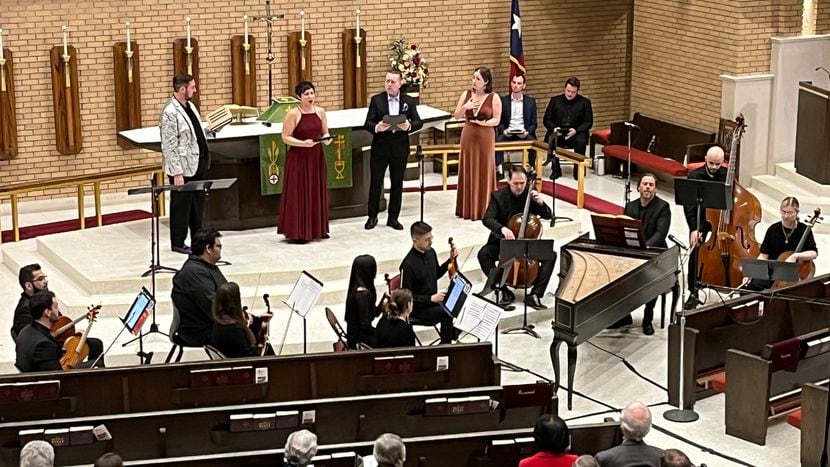
Even Handel’s operas were little known before revivals sparked by the composer’s 1985 tercentenary. Since then, enterprising opera companies have explored other operas of the baroque period. Dallas’ 6-year-old American Baroque Opera Company has delved into long-forgotten works, with increasingly accomplished performances.
Even among extensively experienced operagoers, few would recognize the name John Eccles. But the English composer, a slightly older contemporary of Handel (and Bach and Vivaldi), was well known in his day for operas and music for theatrical productions.
While Handel’s oratorio Semele gets occasional modern performances, Eccles’ earlier opera based on the same William Congreve libretto was never performed even in Eccles’ day. Indeed, its first performance didn’t happen until 1964, at Oxford University.
But there it was Saturday night, in an enhanced concert version — singers mostly at music stands, but interacting for dramatic effects — at Zion Lutheran Church. It proved a consistently engaging and imaginative work, and both vocally and instrumentally, with period-instruments strings and harpsichord, it got a lively and accomplished performance.
It was all the more impressive for being done without a conductor, cellist (and American Baroque Opera Company artistic director) Eric Taeyang Mun just briefly gesturing the tempo before some numbers. Several vocal duets were particularly beautiful, and Mun, concertmaster Guillermo Salas Suárez, and gambist Sydney ZumMallen served up elegant instrumental solos.
Based on a story from Ovid’s Metamorphoses, the opera is about the ill-starred love between the god Jupiter and the mortal Semele. Jupiter’s deservedly jealous wife Juno disguises herself as Semele’s sister Ino to trick Semele into demanding Jupiter display himself in full godly glory. Semele is consumed in the fiery theophany, although at the opera’s end, Apollo prophesies the birth of Bacchus from Semele’s ashes.
Paul Max Tipton supplied a gloriously godly baritone for Jupiter. As blushing-maid Semele, Paulina Francisco expressively deployed a soprano of both brightness and depth, just occasionally a little keen on top.
Erin Roth Thomas’ well-appointed and disciplined mezzo left no doubt of Juno’s wisdom and wiles. Javier Ortiz didn’t have huge parts to play as Apollo and the sleep god Somus, but his big, high-density bass-baritone was a thing of wonder. Another singer with a slight part but a sit-up-and-take-notice vocalism was Micah Perry, a Second Priest with a bright lyric tenor and suave delivery.
As Ino and Cupid, Alissa Ruth Suver supplied a gleaming soprano. Elizabeth McGee’s soprano glowed powerfully at the top for Juno’s handmaid Iris, but went a bit soft-edged below. Nicholas Garza skillfully negotiated the high tenor role of the prince Athamas. Patrick Gnage and William Derusha endowed Cadmus and the Chief Priest, respectively, with leathery baritones.
The biggest challenge was the church’s lively acoustic, wonderful for choral music but a bit too bright and ringing for music meant for relatively “dry” London theaters. This accentuated the edge on a couple of voices, and unaccented syllables disappeared under ringing accented ones. And maybe a conductor really attuned to vocal issues could have encouraged more evenness between singers’ upper and lower registers — and better projection of consonants.
